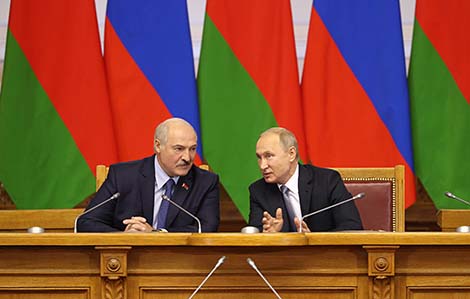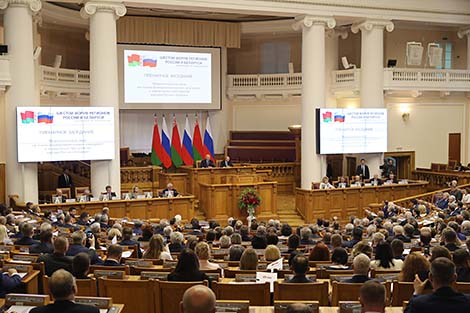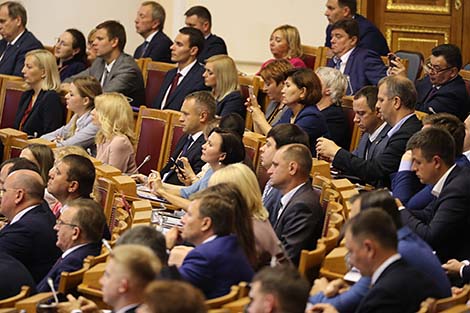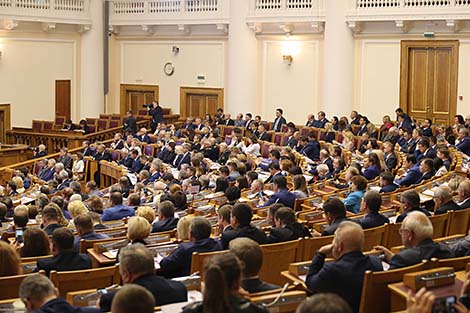Opinions & Interviews
Cooperation, common history, integration in Belarus president’s speech in St Petersburg

ST PETERSBURG, 18 July (BelTA) – Belarus President Aleksandr Lukashenko made a speech during the plenary session of the 6th Forum of Regions of Belarus and Russia in St Petersburg on 18 July. In his speech the head of state drew attention to Belarus-Russia interaction in various areas. He emphasized humanitarian cooperation and regional ties, remarked upon the history Belarusians and Russians share, and underlined the importance of pursuing an effective youth policy in addition to making a few remarks about integration, BelTA has learned.
President of Russia Vladimir Putin made a speech before the Belarusian head of state had the chance to do the same. Aleksandr Lukashenko said: “If my speech repeats ideas of the president of Russia, it will be no plagiarism. We just happen to think the same things at times. I am sincerely glad to be given the opportunity to meet with you in the cultural capital of Russia – the glorious city of Leningrad [St Petersburg] that I love.”
“Just what I was saying, Aleksandr Grigoryevich [Lukashenko],” Vladimir Putin noted.
The audience responded to the dialogue with applause.

Aleksandr Lukashenko noted he had not mentioned his love for St Petersburg in order to flatter the president of Russia, who had been born in this city. Aleksandr Lukashenko stressed that residents of Belarus and Leningrad suffered during the Great Patriotic War of 1941-1945 more than others did. “We’ve carried all the hardships of that war on our shoulders. And I am simply stunned by the reborn city of St Petersburg. I told Vladimir Vladimirovich [Putin] about it yesterday. You’ve done well reviving this city and continuing its powerful evolution. This is why I treat this sacred city with such respect, kindness, and love,” Aleksandr Lukashenko added.
Cultural integration and the contribution of Belarusian diaspora
Aleksandr Lukashenko drew attention to the fact that St Petersburg – the cultural capital of Russia – had been chosen to host the 6th Forum of Regions of Belarus and Russia. “Since its foundation upon orders of Peter the Great and up till now the city has been a center of events inseparably linked to the history of Russia and our fatherland. To the history sons and daughters of Belarus have played a noticeable role in. Everyone, who studied and worked here in various years,” the Belarusian head of state stated.
“St Petersburg has always attracted creative people from various cities and countries such as architects, musicians, scientists, art critics, writers, and poets,” Aleksandr Lukashenko went on saying. “By the way, St Petersburg residents, particularly architects and scientists, have made the largest contribution to the restoration of the war-torn Minsk. It was Leningrad residents who had played a major role in reviving today’s science in Belarus. We honor it and remember it.”
“In modern terms the city performed and performs the function of cultural integration of our countries and nations. This is why it is no surprise that this city with its rich history and centuries-old traditions naturally determined the agenda of today’s meeting. It is dedicated to the common cultural and humanitarian space of our nations in the context of interregional contacts,” the Belarusian leader said.
In his words, modern Belarusian-Russian ties in these areas are characterized by a broad scope, special diversity, and a large number of large-scale events. About 70 constituent territories of the Russian Federation have signed agreements on bilateral cooperation in the sphere of culture with all the oblasts of Belarus. International art festivals are arranged as well as major art exhibitions, international theater and movie forums, days of culture of the regions of Belarus and Russia.
“Belarusians, who live in Russia, make a considerable contribution to the advancement of cultural and humanitarian ties. Over 20 Belarusian national autonomies operate here. About 80 public organizations of Belarusians, culture and enlightenment societies, associations of fellow countrymen maintain tight ties with the historical homeland and represent national cultural and spiritual traditions, the native language in Russia,” Aleksandr Lukashenko pointed out.
Cooperation of public organizations of Belarusians in Russia with specific towns, cities, and districts of Belarus is strong, too.
 Interaction in education and science
Interaction in education and science
Aleksandr Lukashenko mentioned growing Belarus-Russia cooperation in education. The existing legal base (over 1,300 agreements of various levels) enables equal education opportunities for Belarusians and Russians, including in the top higher education institutions of both countries. Over 11,000 Belarusian citizens go to Russian institutes, academies, and universities and over 1,500 citizens of Russia study in Belarus, Aleksandr Lukashenko noted.
“The Belarusian-Russian University in Mogilev plays an important role in shaping the common education space in the Union State of Belarus and Russia. A branch of the Moscow State University of Economics, Statistics, and Informatics works well in Minsk. Thanks to efforts of the Union State of Belarus and Russia a branch of the Russian State Social University has been opened in Minsk,” Aleksandr Lukashenko noted.
Aleksandr Lukashenko went on saying that Belarusian-Russian R&D cooperation traditionally remains strong in various sectors such as space exploration, information technologies, agriculture, production of materials and instruments.
“The Belarusian nuclear power plant has been mentioned here as well as outer space exploration. It is our pragmatic goal – to catch up with the elder brother in things the brother does well and teach the same competences to Belarusians themselves. The nuclear power plant is a case in point. It is being built under the supervision of Russian specialists but Belarusians represent an overwhelming majority of the workforce,” Aleksandr Lukashenko said. “The most promising areas of further cooperation include such highly intellectual areas as nanomaterials, radio electronics, and the most popular branches of medical science where Belarusians have been strong since the Soviet times.”
Historical connections and common memory
According to the Belarusian head of state, ties between regions of Belarus and Russia took decades to evolve and were largely shaped by the common history and shared fates of the people. The Belarusian leader stressed: “Belarusians and Russians have gone through many trials and have endured them together with honor!”
“We have nothing to be ashamed of in our history. We should hold it sacred. Because it is our greatest legacy. When the West criticizes us – more in the past, slightly less these days and not because they have more conscience now – I tell them: you have yet to settle accounts with us for the last war that you brought to us, for the war we didn’t recover from for seven decades. This is why you should be careful when you speak about human rights, democracy, and deliver other unjustified criticisms at times,” Aleksandr Lukashenko stated.
“Here, in the heroic land of Leningrad I would like to say once again: memory of that war is sacred for Belarusians,” the Belarusian leader stressed. “This year we’ve come up to another historic milestone – the 75th anniversary of lifting the blockade of Leningrad and Belarus’ liberation. Next year we will stand united as we celebrate the date every Soviet person holds sacred and dear – the 75th anniversary of the Great Victory.”
Aleksandr Lukashenko believes these historical milestones are important for uniting Belarusians and Russians, for bolstering the ideological foundation of the Union State of Belarus and Russia. “There are not many participants and witnesses of those tragic and glorious events left but we are happy they are with us. It is they, who carry on the true history that some are trying to rewrite these days. First-hand accounts of those events are the best way to protect and pass on the memory about our common heroic past to the next generations. Modern young people need to know who we have to thank for our lives, freedom, and independence,” Aleksandr Lukashenko was convinced.
Aleksandr Lukashenko drew attention that these fundamental values that Belarusians and Russians share should be used to shape the world view of the young generation.
 Contribution of young people to the development of the Union State of Belarus and Russia
Contribution of young people to the development of the Union State of Belarus and Russia
“The viability of our integration project will depend on the degree of involvement of young people in the construction of the Union State of Belarus and Russia. The sacred deed [Chairwoman of the Federation Council of the Russian Federation] Valentina Ivanovna [Matviyenko] and [Chairman of the Council of the Republic of the National Assembly of Belarus] Mikhail Vladimirovich [Myasnikovich] do here, in St Petersburg land today deserves the deepest respect, support, and encouragement. It is necessary to support initiatives of youth associations to organize festivals, contests, exhibitions, and other events not only in capital cities but in the regions, too,” Aleksandr Lukashenko believes.
As a good example he mentioned the annual academic excellence competition for Belarusian and Russian school students “Belarus and Russia: Historical and spiritual affinity”, which gathers dozens of teams from constituent territories of the Russian Federation. “This year over 250 participants of Belarusian and Russian student summer work teams are helping build the Belarusian nuclear power plant near Ostrovets. Such examples of interaction of youth organizations should be used to shape positive information space. Timely and quality reports of our mass media should fully eclipse unprofessional and questionable sources,” the Belarusian leader continued.
Joint sport events
Aleksandr Lukashenko pointed out that both Belarus and Russia pay close attention to sport, to encouraging young people to go in for sports. The Union State Spartakiad for kids and teenagers has been held since 2003. It is a versatile event that features Olympic and non-Olympic sports.
“We host international sport competitions of the highest caliber. The number includes the world football championship Russia hosted in 2018 and the 2nd European Games Minsk 2019, which took place in Belarus virtually one month ago,” Aleksandr Lukashenko noted. “The Russian team brought glory to its country during the world football championship in Russia. The Russian team became a winner during the 2nd European Games Minsk 2019, too. By doing so, Russia demonstrated that not only does Russia have reserves, the country competes cleanly in sports and can freely win. Don’t forget you’ve proven that in Minsk. By the way, everyone was checked for performance-enhancing drugs most rigorously. Not a single case has been registered in the Russian team or the Belarusian one. These are objective facts.”
“Perhaps we should think about hosting such events by submitting one bid of Belarus and Russia, with finance made available from the Union State budget. It will allow stimulating the development of the tourism industry in our countries.”
 The essence of integration
The essence of integration
In his speech the Belarusian head of state recalled that the two countries will mark the 20th anniversary of the signing of the Union State Foundation Treaty in December 2019. “A lot has been done to achieve equal rights of citizens of our countries in this period of time. Government groups are now actively working on closer integration and priorities of common development. Vladimir Vladimirovich [Putin] and I have reached agreements in principle on that,” the Belarusian head of state said.
In his words, there are a number of specific essential issues affecting the interests of commercial entities and citizens of Belarus and Russia. “They need to be resolved in the near future. We’ve been working hard on these issues. We’ve come up with agreements in principle, which we will reveal later,” Aleksandr Lukashenko emphasized.
Aleksandr Lukashenko remarked that thousands of Belarusian and Russian enterprises are connected by manufacturing cooperation ties these days. “It is a deliberate policy in Belarus,” the Belarusian leader noted. “In Belarus there are about 2,500 companies with Russian capital while every second foreign company with Belarusian capital is located in Russia.”
“It is necessary to preserve and multiply the positive results of economic efforts. The applied nature of our agreements at the top level is also manifested in the advancement of cooperation between regions. I should thank heads of the regions. I often mention it: there would be even no talk about the union of Belarus and Russia now without you. You were the ones to save this project. Today as we enter a new stage of our development we should do everything to not only keep this project but multiply its fruits. Vladimir Putin and I talked about it today,” Aleksandr Lukashenko said.
Aleksandr Lukashenko stressed that this scrupulous and targeted work enriches bilateral cooperation and brings confidence in tomorrow to the people of Belarus and Russia. “It is what integration is all about: taking care for vital interests of your citizens, pooling efforts to secure social and economic progress in both countries,” the Belarusian leader concluded.
Aleksandr Lukashenko, Vladimir Putin and Viktor Medvedchuk, the head of the political council of the political party Opposition Platform – For Life, had a brief conversation after the forum.







 print version
print version make home page
make home page add to bookmarks
add to bookmarks

